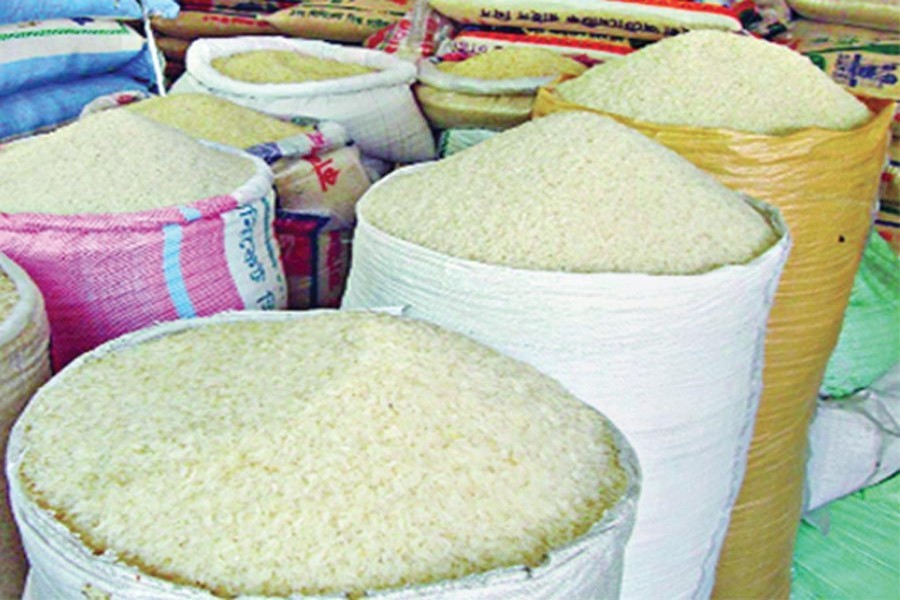
Published :
Updated :

Paddy prices have dropped remarkably this bumper Aman season, hurting the local peasantry who are already struggling with a rise in production costs.
Market watchers said millers, importers and others are getting the most out of this high crop yield.
They said the government's procurement of the staple also helps benefit millers and influential political quarters, not the producers.
Traders, however, said the record import of some Aman rice varieties from neighbouring countries last fiscal have plunged the paddy market.
A recent visit to Khulna, Jashore and Narail districts found that seasonal 'Swarna' and 'BR-11' varieties selling at Tk 580-620 per maund (40 kilogram).
Sources in Rangpur, Rajshahi, Pabna and Kushtia regions said paddy was trading at Tk 600-650 a maund.
The current paddy prices are Tk 120-150 less per maund this season than that of last year, according to the available government data.
Yanoor Rahman, a farmer at Abdulpur under Jashore Sadar upazila, grew Swarna on 5.0 bighas of land and harvested 85 maunds of the staple.
The production cost was exorbitantly high at Tk 800 per maund, he told the FE on Sunday.
Mr Rahman said production cost rose by Tk 60-70 per maund as they had to irrigate crops additionally this year through lack of rain.
He also cited high labour charge of Tk 600-700 per day to harvest paddy against last year's Tk 400-450.
The farmer said imported rice was still dominating Jashore markets, hurting the growers.
The cultivators of Khulna and Narail are having the identical problems Mr Rahman has been in.
Hazrat Ali, proprietor of Nilphamari-based Olima Traders, said importers in bordering areas have still a huge stock of rice.
Big importers brought rice like Swarna and Najirshail, alternative to local Aman varieties, he added.
Mr Ali said importers reduced the price of Swarna by selling the rice at Tk 30-32 a kg for the past one month in Rangpur and Rajshahi regions.
Big millers were buying paddy in lesser volume following a low demand, he mentioned.
The trader said Miniket sells at Tk 44-48 and BR-28 at Tk 34-35 a kg, at least 15 per cent less than that of last year.
Meanwhile, Bangladesh Auto Major Husking Mill Owners Association secretary KM Layek Ali said the milling of new paddy is yet to start in most mills.
They still have a stockpile from Boro season, he added.
The millers' leader said Aman will begin to be pricier from next month as imported rice stock will run out.
The daily rice import has declined to 600 tonnes which was 10,600 tonnes before duty was slapped, he cited.
The government re-imposed 28 per cent duty on rice import from last June.
The country imported record 4.0 million tonnes of rice in last fiscal year.
Mr Layek said the import duty should continue to benefit both farmers and consumers.
However, the government purchased a record 1.5 million tonnes of rice in Boro season at Tk 37 per kg, all from the millers.
A senior official at the Directorate General of Food told the FE that the government purchased 0.45 million tonnes in last Aman season.
It targets 0.4-0.5 million tonnes this year, he said.
Dr Wais Kabir, former executive chairman of Bangladesh Agricultural Research Council, sees bumper output as a bane for farmers but a boon for millers and traders.
Import has been restricted from last June. The big millers and traders have an influence on the domestic paddy market, he told the FE.
The agriculturist said the government restricted import during Boro harvest and farmers got some benefit.
The state must monitor millers and importers routinely in the interests of farmers and consumers, said Mr Kabir, now executive chairman of Bangladesh Krishi Gobeshona Foundation.
It should take measures to buy rice and paddy directly from farmers so they can make a profit.
According to the monitoring unit under the Field Services Wing of the Department of Agriculture Extension, 38 per cent of Aman paddy has been harvested as of November 12.
The government is expecting Aman output to reach 14.1 million tonnes this year from 13.5 million tonnes last season.
The yield this year is good as more than 5.65 million hectares of land were brought under farming-the acreage is 3.0 per cent higher than last season's.
tonmoy.wardad@gmail.com


 For all latest news, follow The Financial Express Google News channel.
For all latest news, follow The Financial Express Google News channel.